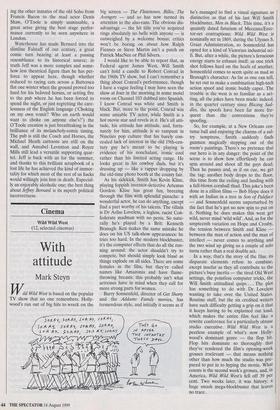Cinema
Wild Wild West (12, selected cinemas)
With attitude
Mark Steyn
Wild Wild West is based on the popular TV show that no one remembers. Holly- wood's run out of big hits to wreck on the big screen — The Flintstones, Bilko, The Avengers — and so has now turned its attention to the also-rans. The obvious dis- advantage — the hit title you've acquired rings absolutely no bells with anyone — is outweighed by a welcome bonus: critics won't be boring on about how Ralph Fiennes or Steve Martin isn't a patch on Patrick MacNee or Phil Silvers.
I would like to be able to report that, as Federal agent James West, Will Smith can't hold a candle to Robert Conrad in the 1960s TV show, but I can't remember a thing about Conrad's performance, though I have a vague feeling I may have seen the show at four in the morning in some motel room on Channel 103 dubbed into Spanish. I know Conrad was white and Smith is black. But, more to the point, Conrad was some amiable TV actor, while Smith is a hot movie star and revels in it. He's all atti- tude, his attitude has attitude, and, fortu- nately for him, attitude is so rampant in Nineties pop culture that his barely con- cealed lack of interest in the old 19th-cen- tury guy he's meant to be playing is evidence of his nonchalant, ironic cool rather than his limited acting range. He looks great in his cowboy duds, but it's dressing up — like a rapper dropping by the old-time photo booth at the county fair.
As his sidekick, Smith has Kevin Kline, playing foppish inventor-detective Artemus Gordon. Kline has great fun, breezing through the film with splendid panache: a wonderful actor, he can do anything, except find a part worthy of his talents. The villain is Dr Arliss Loveless, a legless, racist Con- federate madman with no penis. So natu- rally he's played by a Brit: Kenneth Branagh. Ken makes the same mistake he does on his US talk-show appearances: he tries too hard. In the modern blockbuster, it's the computer effects that do all the run- ning around: the actor shouldn't try to compete, but should simply look blast as things explode on all sides. There are some females in the film, but they're called names like Amazonia and have flame- throwing breasts: this probably isn't what actresses have in mind when they call for more strong parts for women.
Barry Sonnenfeld, director of Get Shorty and the Addams Family movies, has tremendous style, and initially it seems as if he's managed to find a visual signature as distinctive as that of his last Will Smith blockbuster, Men in Black. This time, it's a quaintly dated futurism of Meccano/Erec- tor-set contraptions: Wild Wild West is nominally set in 1869, during the Ulysses S. Grant Administration, so Sonnenfeld has opted for a kind of Victorian industrial sci- fi. But, after a while, the picture's ferocious energy starts to exhaust itself: as one trick shot follows hard on the heels of another, Sonnenfeld comes to seem quite as mad as Branagh's character. As far as one can tell, he set out to make a combination high-tech action spoof and ironic buddy caper. The trouble is the west is so familiar as a set- ting, all the jokes have been made: indeed, in the quarter century since Blazing Sad- dles, the spoofs have been far more fre- quent than the conventions they're spoofing.
So, for example, at a New Orleans cos- tume ball and enjoying the charms of a sul- try temptress, Smith suddenly finds gunmen magically stepping out of the room's paintings. There's no pretence that our hero is in any danger: the point of the scene is to show how effortlessly he can spin around and shoot all the guys dead. Then he pauses and, as if on cue, we get the tag: another body drops to the floor, this time from the ceiling and landing with a full-blown cornball thud. This joke's been done in a zillion films — Bob Hope does it with an Indian in a tree in Son of Paleface — and Sonnenfeld seems unperturbed by the fact that he's got no new spin to put on it. Nothing he does makes this west get wild, never mind 'wild wild'. And, as for the umpteenth variation on Hope and Crosby, the tension between Smith and Kline between the man of action and the man of intellect — never comes to anything and the two wind up giving us a couple of solo turns rather than a real double act.
In a way, that's the story of the film: its disparate elements refuse to combine, except insofar as they all contribute to the picture's busy inertia — the tired Old West settings, the pointless computer tricks, the Will Smith attitudinal quips . . . The plot has something to do with Dr Loveless wanting to take over the United States. Routine stuff, but the six credited writers have such difficulty getting a grip on it that it keeps having to be explained out loud, which makes the entire film feel like a rewrite conference for a particularly obtuse studio executive. Wild Wild West is a peerless example of what's now Holly- wood's dominant genre — the flop hit. Flop hits dominate so thoroughly that they've rendered the film's opening-week grosses irrelevant — that means nothing other than how much the studio was pre- pared to put in to hyping the movie. What counts is the second week's grosses, and, In America, Wild Wild West's fell off 39 per cent. Two weeks later, it was history: a huge smash mega-blockbuster that leaves no trace.


























































 Previous page
Previous page